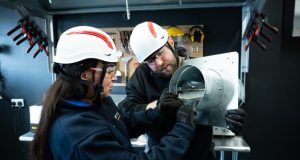Residential rodent enquiries have reached record levels for the months of March and April, according to data released today by Rentokil Pest Control.
Rodent enquiries traditionally decline as the weather warms up, however, enquiry data covering the first two months of the lockdown period (March – April) reveal enquiries are 45 per cent above the six-year average.
The experts suggest part of the increase in enquiries can be attributed to fact that people are at home as a result of lockdown measures, and therefore more likely to notice the signs of rodents. In fact, Rentokil Pest Control recorded a 79 per cent increase in web traffic to its ‘signs of rats’ webpage this April, when compared to the same month in 2019.
However, increasing rodent activity could be part of a longer-term trend owing to warmer winters over recent years, which has allowed rodent populations to increase. Traditionally, colder winters naturally curtail rat and mouse numbers, but milder weather patterns can allow rodents to have more litters in a season. It also increases the number of rodents in a litter that are likely to survive to adulthood.
With large numbers of commercial premises currently unoccupied and the weather starting to warm up, the pest control experts warn that rodent populations could continue to thrive.
Paul Blackhurst, Head of Technical Academy at Rentokil Pest Control explained: “Unoccupied office buildings across the country could be providing rodents with an opportunity to breed undisturbed. This, combined with the fact that fewer rodents will have died off in this winter, which was the warmest European winter on record,[1] means that populations could multiply very quickly. Rats have a gestation period of 21 – 23 days and will have five – 10 pups per litter. So two rats can multiply to almost 500 million rodents in just three years if breeding conditions remain ideal.[2]
“The rise in rodent activity in people’s homes could be the tip of the iceberg when it comes to the total rodent population. It is advisable that commercial premises take proactive measures to prevent pests from taking up residence in their facilities whilst they are unoccupied.”
Businesses are increasingly turning to digital technologies to address pest issues as these provide continuous site surveillance to help inform pest prevention strategies. Rentokil’s PestConnect is one of these solutions, a connected, digital pest management system that provides 24/7 monitoring, rapid response and effective control of rodents. It alerts businesses if a rat or mouse has entered the premises and can provided detailed insights helping pest controllers to coordinate the most effective response.
Analysis of data from over 7,000 PestConnect systems deployed across the UK has revealed that the most common time for rodents to be active in commercial premises is 0.24am – a time when few people are going to be onsite.
It also provides intelligence as to where rodents are most active in premises, helping to deliver insight that ensures hidden points of access and hiding places that may not otherwise be discovered can be checked. For example, analysis of data found that 30 per cent of infestations in warehouses and distribution centres originate in the loading bay area, where building entrances are frequently open.
Blackhurst concluded: “Once rodents gain access to premises they can be difficult to control. A mouse can survive on as little as three grams of food per day and can eat from up to 70 different sources of food within 24 hours. Early detection is one of the best weapons a business has in the fight against rodents. But problems can easily go unnoticed because they are most commonly active around midnight, a time when most commercial premises are often empty. That’s why businesses are increasingly turning to connected technology in the fight against pests.
“Digital pest prevention technology is also particularly useful in the current environment. PestConnect remotely monitors and protects businesses 24/7, providing an alert only if rodent is detected, which means we only visit our customer’s premises when absolutely necessary, to reduce the risk of the spread of Coronavirus. As businesses think about how employees might be able to return to office environments, it’ll be important for them to check that pests haven’t moved in.”




